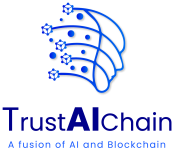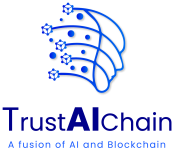In the rapidly evolving landscapes of artificial intelligence (AI) and blockchain technology, a new paradigm is emerging that promises to redefine how we manage and govern AI systems: decentralized AI governance. This model leverages the principles of decentralization inherent to blockchain technology to create more transparent, accountable, and equitable AI systems. In this comprehensive exploration, we will delve into the mechanisms, purposes, and benefits of decentralized AI governance models, shedding light on why they may represent a crucial step forward in the ethical deployment of AI technologies.
Understanding Decentralized AI Governance
Decentralized AI governance refers to using blockchain technology to distribute the decision-making processes of AI systems across multiple stakeholders rather than centralizing authority in a single entity. This approach mirrors the decentralized nature of blockchain itself, which operates without a central point of control.
Mechanics of Decentralization in AI
Blockchain technology allows for creating a distributed ledger that is immutable and transparent. When applied to AI governance, blockchain can facilitate:
Smart Contracts:These are self-executing contracts with the terms directly written into code. They can be used to automatically enforce and verify compliance with governance protocols without the need for intermediaries.
Decentralized Data Management: Ensuring that the data used by AI systems is accurate, unbiased, and not manipulated is crucial. Blockchain can secure data provenance and provide transparency in data usage and sharing.
Tokenization: This involves the issuance of digital tokens to incentivize and reward behaviors that support the network and adhere to agreed-upon governance models.
The Purpose of Decentralized AI Governance
The primary aim of decentralized AI governance is to address several of the challenges faced by traditional centralized AI systems, which include:
Bias and Fairness: Centralized systems often reflect the biases of their creators, which can be mitigated by having diverse stakeholders in a decentralized governance model.
Transparency and Accountability: Decentralized systems can increase transparency in AI decision-making processes and make auditing and holding systems accountable easier.
Security and Privacy:By decentralizing the storage and processing of data, blockchain can enhance the security and privacy of sensitive information used by AI systems.
Benefits of Decentralized AI Governance
Adopting decentralized governance models for AI systems brings several significant advantages:
Enhanced Trust: By making the operations of AI systems more transparent and accountable, trust among users and stakeholders is improved.
Reduced Risk of Abuse: Decentralized control mitigates the risk of power being abused by a single authority, promoting a fairer distribution of power and responsibility.
Increased Innovation: Decentralized governance models can encourage innovation by allowing multiple stakeholders to contribute to developing and managing AI systems.
Robust Security Features: Using blockchain can enhance the integrity and security of the data feeding into AI systems, thereby improving the overall robustness of these systems.
Autonomy and Accountability:AI agents with decentralized identities can make decisions autonomously while being held accountable through transparent transaction records on the blockchain.
Interoperability:Decentralized identities enable AI agents to interact across different platforms and ecosystems, enhancing the potential for cross-platform collaborations and innovations.

Case Studies and Real-world Applications
Several pioneering projects exemplify the potential of decentralized AI governance:
Ocean Protocol: This platform uses blockchain to enable secure sharing and governance of data, facilitating safer, and more equitable AI development.
SingularityNET: A decentralized marketplace for AI services, allowing users to create, share, and monetize AI technologies at scale.
DAOs for AI Governance: Decentralized Autonomous Organizations (DAOs) have been proposed to manage AI projects, where governance and decision rights are encoded via smart contracts on a blockchain.
Numeraire by Numerai:It is a hedge fund that operates on the principle of decentralized data science. Using blockchain, Numerai hosts weekly data science competitions where participants develop machine learning models on encrypted data to predict stock market movements.
Numeraire (NMR) is Numerai’s native cryptocurrency used to incentivize data scientists. Based on their models ‘ accuracy, participants stake NMR on their predictions and payouts. This mechanism rewards the most accurate and reliable models, promoting a merit-based governance system. The decentralized approach reduces the risk of data manipulation and bias since predictions are made on encrypted data. It also democratizes access to financial modeling, allowing data scientists worldwide to contribute irrespective of their affiliation with traditional financial institutions.
DeepBrain Chain:It is a decentralized neural network that aims to reduce the cost of AI computing. Leveraging blockchain technology creates a distributed network of computing resources, which AI developers can utilize to train neural networks cost-effectively. The governance model is based on a decentralized autonomous organization (DAO) structure where token holders vote on key decisions, including resource allocation, pricing, and technological updates. This ensures that the control and decision-making are spread across a diverse group of stakeholders rather than being centralized in a single entity. This platform significantly lowers the barriers to entry for AI development by providing affordable, scalable computing power. It also ensures transparency in resource allocation and pricing through its decentralized ledger.
Ben Goertzel’s SingularityNET: Allows AI developers to create, share, and monetize AI services at scale. It is an open-source protocol and collection of smart contracts for a decentralized market of coordinated AI services. AI service developers use the AGI token to participate in the network on this platform. Decisions about the platform’s development are made through democratic voting mechanisms among AGI token holders, ensuring all stakeholders can influence the platform’s future direction. SingularityNET facilitates a global AI marketplace where developers can sell AI capacities on demand, without intermediaries. This not only fosters innovation and accessibility in AI technologies but also promotes a more equitable distribution of economic benefits from AI development.
AI DAO:It represents a conceptual model in which AI projects are managed through a decentralized autonomous organization run on smart contracts. Through a transparent, blockchain-based platform, stakeholders can contribute to various aspects of AI development, such as funding, designing, and training. AI DAO, every aspect of project governance, including decision-making, fund allocation, and reward distribution, is regulated by pre-coded smart contracts. This eliminates human biases and errors from the governance process, ensuring that decisions are based solely on pre-agreed rules and stakeholder consensus. It can revolutionize AI project management by enhancing transparency, reducing administrative overhead, and distributing governance across a global community of contributors. This model also provides a framework for ethical AI development, as community guidelines and ethical standards are encoded directly into the DAO’s operating protocols.
These case studies demonstrate the feasibility and the diverse applications and advantages of decentralized AI governance across different sectors and operations. As these models continue to develop and mature, they promise to reshape the landscape of AI governance in favor of more transparent, equitable, and community-driven frameworks.

Challenges and Future Directions
While decentralized AI governance models hold promise, they also face significant challenges. Scalability, the complexity of managing distributed systems, regulatory compliance, and ensuring equitable participation are among the hurdles that must be addressed. As these technologies mature, the development of standardized frameworks and the involvement of regulatory bodies will be crucial in ensuring that decentralized AI governance models can be successfully implemented and scaled.
As we continue to explore the transformative potential of decentralized AI governance, it becomes imperative to understand how this approach can significantly advance accountability within AI systems. This section delves deeper into the mechanisms and real-world implications of implementing a distributed decision-making framework.
Decentralized AI governance models fundamentally change the landscape of AI decision-making by integrating a participatory approach. This means that developers, corporate stakeholders, users, and impacted communities can have a say in how AI systems are developed, deployed, and managed. This inclusive approach ensures that the AI systems are more reflective of diverse societal needs and ethical standards.
Incentivization
Decentralized AI governance isn’t just about managing technological assets; it’s also about creating sustainable economic models that incentivize ethical AI practices.
Behavioral Incentives: Token economics can be utilized to reward stakeholders for behaviors that enhance the AI network’s value, such as data sharing, algorithmic auditing, and ethical governance practices.
Microtransactions for Microtasks: AI systems can employ blockchain to facilitate microtransactions, where stakeholders can be compensated for small tasks that support the AI ecosystem, such as data validation and annotation.
Developing global standards and frameworks is crucial for decentralized AI governance models to be effective. These standards should support the technological integration of blockchain and AI and address ethical considerations, user protection, and data sovereignty.
Engaging international bodies and cross-border organizations in creating and adhering to standards can help manage the global nature of AI and blockchain technologies. Developing open protocols ensures that decentralized AI governance models are accessible and can be adopted by stakeholders worldwide, promoting a global approach to ethical AI.

In Summary
Decentralized AI governance models offer a forward-thinking approach to managing and regulating AI systems. By integrating the transparency, security, and collaborative potential of blockchain technology, these models aim to create AI systems that are not only effective but also equitable and ethical. As we stand on the brink of significant technological convergences, the exploration and adoption of decentralized AI governance will be essential in shaping a future where AI technologies are governed in a manner that is truly beneficial for all.
The shift towards decentralized AI governance models represents a critical evolution in the ethical management of AI technologies. By democratizing decision-making, enhancing accountability through decentralized identities, creating economic incentives for ethical behavior, and fostering international collaboration, we can harness the full potential of AI in a manner that aligns with societal values and ethical standards. This progressive approach prepares us for tomorrow’s challenges and ensures that AI’s benefits are universally accessible and beneficial.







